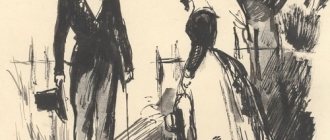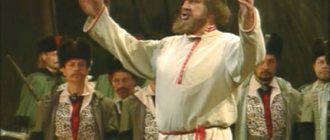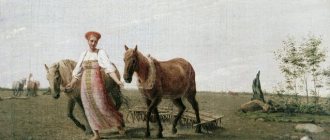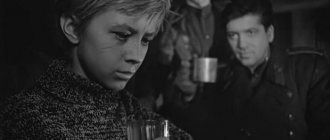I
The spring, bright day was approaching evening; small pink clouds stood high in the clear sky and, it seemed, did not float by, but went into the very depths of the azure.
In front of the open window of a beautiful house, in one of the outer streets of the provincial town of O... (this happened in 1842), two women were sitting - one about fifty years old, the other an old woman, seventy years old.
The first of them was called Marya Dmitrievna Kalitina. Her husband, a former provincial prosecutor, a well-known businessman in his time - a lively and decisive man, bilious and stubborn - died ten years ago. He received a fair upbringing, studied at the university, but, born into a poor class, he early realized the need to make his own way and make money. Marya Dmitrievna married him out of love: he was good-looking, smart and, when he wanted, very kind. Marya Dmitrievna (in her maiden name Pestova) lost her parents as a child, spent several years in Moscow, at the institute, and, returning from there, lived fifty miles from O..., in her ancestral village of Pokrovskoye, with her aunt and older brother. This brother soon moved to St. Petersburg to serve and kept both his sister and aunt in a black body until sudden death put an end to his career. Marya Dmitrievna inherited Pokrovskoe, but did not live in it for long; in the second year after her wedding to Kalitin, who managed to win her heart in a few days, Pokrovskoye was exchanged for another estate, much more profitable, but ugly and without an estate; and at the same time, Kalitin purchased a house in the city of O..., where he and his wife settled permanently. There was a large garden next to the house; on one side it went straight into the field, outside the city. “So,” decided Kalitin, a great reluctance to rural silence, “there is no need to wander into the village.” Marya Dmitrievna more than once regretted in her heart her pretty Pokrovsky with its cheerful river, wide meadows and green groves; but she did not contradict her husband in anything and was in awe of his intelligence and knowledge of the world. When, after a fifteen-year marriage, he died, leaving a son and two daughters, Marya Dmitrievna had already become so accustomed to her home and to city life that she herself did not want to leave O...
Marya Dmitrievna's eldest daughter, Lisa. Artist K. I. Rudakov.
Marya Dmitrievna in her youth enjoyed the reputation of a pretty blonde; and at fifty years old her features were not devoid of pleasantness, although they were a little swollen and blurred. She was more sensitive than kind, and retained her college habits until her mature years; she spoiled herself, became easily irritated and even cried when her habits were violated; but she was very affectionate and kind, when all her wishes were fulfilled and no one contradicted her. Her house was one of the most pleasant in the city. Her condition was very good, not so much hereditary as acquired by her husband. Both daughters lived with her; the son was brought up in one of the best government institutions in St. Petersburg.
The old woman sitting with Marya Dmitrievna under the window was the same aunt, her father’s sister, with whom she had once spent several solitary years in Pokrovskoye. Her name was Marfa Timofeevna Pestova. She was known as an eccentric, had an independent disposition, spoke the truth to everyone's face and, with the meager means, behaved as if thousands were following her. She could not stand the late Kalitin and, as soon as her niece married him, she retired to her village, where she lived for ten whole years with a peasant in a smoking hut. Marya Dmitrievna was afraid of her. Black-haired and quick-eyed even in old age, small, pointed-nosed, Marfa Timofeevna walked briskly, stood straight and spoke quickly and clearly, in a thin and sonorous voice. She always wore a white cap and a white jacket.
-What are you talking about? - she suddenly asked Marya Dmitrievna. -What are you sighing about, my mother?
“Yes,” she said. - What wonderful clouds!
- So you feel sorry for them, or what?
Marya Dmitrievna did not answer.
- Why is Gedeonovsky missing? - said Marfa Timofeevna, deftly moving her knitting needles (she was knitting a large woolen scarf). “He would have sighed with you, or he would have lied something.”
- How you always speak strictly of him! Sergei Petrovich is a respectable man.
- Honorable! - the old woman repeated reproachfully.
- And how devoted he was to his late husband! - said Marya Dmitrievna, - she still cannot remember him indifferently.
- Still would! “he pulled him out of the mud by the ears,” Marfa Timofeevna grumbled, and the knitting needles moved even faster in her hands.
“He looks so humble,” she began again, “his head is all gray, and when he opens his mouth, he lies or gossips.” And also a state councilor! Well, let’s just say: Popovich!
- Who is without sin, auntie? Of course, he has this weakness. Sergei Petrovich, of course, did not receive any education; he does not speak French; but he is, as you please, a pleasant person.
- Yes, he keeps licking your hands. He doesn’t speak French, what a disaster! I myself am not strong in the French dialect. It would be better if he didn’t speak in any way: he wouldn’t lie. By the way, he’s easy to remember,” added Marfa Timofeevna, glancing at the street. “Here he comes, your nice man.” So long, like a stork!
Marya Dmitrievna straightened her curls. Marfa Timofeevna looked at her with a grin.
- What is it that you have, no gray hair, my mother? Scold your Broadsword. What is she looking at?
“You, auntie, always…” Marya Dmitrievna muttered with annoyance and tapped her fingers on the arm of the chair.
- Sergei Petrovich Gedeonovsky! - the red-cheeked Cossack squeaked, jumping out from behind the door.
Text of the book “The Noble Nest. Fathers and Sons (collection)"
Ivan Turgenev The Noble Nest. Fathers and Sons
© Publishing House “Veche” LLC, 2016
© Publishing House “Veche” LLC, electronic version, 2017Publishing house website www.veche.ru
Ivan Sergeevich Turgenev
Do we live to be happy?
Every novel is a “stove” in which you can warm yourself. Firewood or coals are thrown into it - love, money, ambition, revenge, etc. There are not many types of “fuel” - passions and motives that drive people’s behavior. So why do some of the novels remain for a long time or forever, if all novelists write about the same thing - about human life? What “fireproof” did Ivan Turgenev (1818–1883) capture in his best novels, “The Noble Nest” and “Fathers and Sons”?
Well, firstly, this very image of the inevitable ruin of parental nests (not only “noble ones”), known to every elderly person. In Russian literature, it was Turgenev who laid one of the cornerstones of our self-awareness, to which only a dead heart will not respond. From here there is a direct path to the poetics of landowner life in Tolstoy, to Chekhov’s “The Cherry Orchard,” to Bulgakov’s “Days of the Turbins” - to all the “houses” where clocks tick, tea is drunk, conversations are held about this and that and nothing, and so Over time, “hearts break.” Why is classical Russian literature so loved and appreciated not only here, but all over the world?
Turgenev turned out to be extremely sensitive not only to the music of the time, which is the charm of his prose, but also to the so-called spirit of the time, which is why debates about his work were heated not only during his lifetime, but are palpable to this day. It was he who brought the drama of generational change in public life to the conceptual level in his novel “Fathers and Sons.” It is remarkable that he did this without any theorizing, using typical examples of ambiguous, inconsistent, very life-like characters. A nihilist who believes in nothing but chemistry confesses to unrequited love and dies from it (blood poisoning is not the cause, but the result). Mayakovsky could have played the role of Bazarov and allegedly wanted to. The Anglomania of Father Lavretsky, dear to the heart of the “Westernizer” Turgenev, turns out to be husk, like the beliefs of all three Kirsanovs, and the liberalism of the future “demons” turns out to be provincial apeism.
But there was not a drop of evil in Ivan Sergeevich’s heart. He didn’t want to be a judge, moreover, he wanted to sit on all the chairs at once, and on such people blows rain down from all sides.
Goncharov accused him of plagiarism, Tolstoy wanted to shoot him, Dostoevsky joked that he closed his eyes during a public execution. Everyone valued him extremely highly, but did not forgive him for his superficiality, lack of will, and softness. Despite the fact that Turgenev was perhaps the most famous Russian hunter of the 19th century, he kept a pack of one hundred and thirty hounds and greyhounds, although his hobby was bird hunting. He met Pauline Viardot’s husband while hunting, after which he lived for 38 years in a strange family union “on the edge of someone else’s nest,” in his own words.
The configuration of his psyche was set by his oppressive mother. And this handsome, strong, intelligent man was doomed to remain henpecked for most of his life, burdened with a sense of guilt. Such are his victimized heroes, victims, that is, of life circumstances and their own choices - Lavretsky, Lisa Kalitina. Which is very Russian, by the way, and even touched Dostoevsky (whom Turgenev considered our Marquis de Sade).
A special article is the so-called “Turgenev girls”, extremely idealized, which was also very Russian. Until Leskov, Chekhov, Bunin, Nabokov came. And Turgenev himself had other heroines, but the reading public did not want to know them. But she welcomed weak-willed heroes in every possible way in order to bite tsarism, which Turgenev himself despised and hated. The Tsar Liberator, by the way, was greatly impressed by his “Notes of a Hunter,” which is a credit to the writer, the Tsar, and the Russian enslaved people.
Surprisingly, the caustic Saltykov-Shchedrin found kind and precise words to express the essence of Turgenev’s prose, after reading which “it’s easy to breathe, easy to believe, feels warm,” so that “you mentally bless and love the author” for the impression that “these leave behind.” transparent images, as if woven from air, this is the beginning of love and light, flowing with a living spring in every line...” Just a poem in prose about the possibility of happiness in life.
Igor Klekh
Noble Nest
I
A bright spring day was approaching evening; small pink clouds stood high in the clear sky and seemed not to float by, but to go into the very depths of the azure.
In front of the open window of a beautiful house, in one of the outer streets of the provincial town of O... (this happened in 1842), two women were sitting: one about fifty years old, the other an old woman, seventy years old.
The first of them was called Marya Dmitrievna Kalitina. Her husband, a former provincial prosecutor, a well-known businessman in his time - a lively and decisive man, bilious and stubborn - died ten years ago. He received a fair upbringing, studied at the university, but, born into a poor class, he early realized the need to make his own way and make money. Marya Dmitrievna married him out of love: he was good-looking, smart and, when he wanted, very kind. Marya Dmitrievna (in her maiden name Pestova) lost her parents as a child, spent several years in Moscow, at the institute, and, returning from there, lived fifty miles from O..., in her ancestral village of Pokrovskoye, with her aunt and older brother. This brother soon moved to St. Petersburg to serve and kept both his sister and aunt in a black body until sudden death put an end to his career. Marya Dmitrievna inherited Pokrovskoe, but did not live in it for long; in the second year after her wedding with Kalitin, who managed to win her heart in a few days, Pokrovskoye was exchanged for another estate, much more profitable, but ugly and without an estate, and at the same time Kalitin acquired a house in the city of O..., where and settled with his wife permanently. There was a large garden next to the house; on one side it went straight into the field, outside the city. “So,” decided Kalitin, a great reluctance to rural silence, “there is no need to wander into the village.” Marya Dmitrievna more than once regretted in her heart her pretty Pokrovsky with its cheerful river, wide meadows and green groves; but she did not contradict her husband in anything and was in awe of his intelligence and knowledge of the world. When, after a fifteen-year marriage, he died, leaving a son and two daughters, Marya Dmitrievna had already become so accustomed to her home and to city life that she herself did not want to leave O...
Marya Dmitrievna in her youth enjoyed the reputation of a pretty blonde; and at fifty years old her features were not devoid of pleasantness, although they were a little swollen and blurred. She was more sensitive than kind, and retained her college habits until her mature years; she spoiled herself, became easily irritated and even cried when her habits were violated; but she was very affectionate and kind, when all her wishes were fulfilled and no one contradicted her. Her house was one of the most pleasant in the city. Her condition was very good, not so much hereditary as acquired by her husband. Both daughters lived with her; the son was brought up in one of the best government institutions in St. Petersburg.
The old woman sitting with Marya Dmitrievna under the window was the same aunt, her father’s sister, with whom she had once spent several solitary years in Pokrovskoye. Her name was Marfa Timofeevna Postova. She was known as an eccentric, had an independent disposition, spoke the truth to everyone's face and, with the meager means, behaved as if thousands were following her. She could not stand the late Kalitin, and as soon as her niece married him, she retired to her village, where she lived for ten whole years with a peasant in a smoking hut. Marya Dmitrievna was afraid of her. Black-haired and quick-eyed even in old age, small, pointed-nosed, Marfa Timofeevna walked briskly, stood straight and spoke quickly and clearly, in a thin and sonorous voice. She always wore a white cap and a white jacket.
-What are you talking about? – she suddenly asked Marya Dmitrievna. -What are you sighing about, my mother?
“Yes,” she said. – What wonderful clouds!
– So you feel sorry for them, or what?
Marya Dmitrievna did not answer.
- Why is Gedeonovsky missing? - Marfa Timofeevna said, deftly moving her knitting needles (she was knitting a large woolen scarf). “He would have sighed with you, or he would have lied something.”
– How you always speak strictly of him! Sergei Petrovich is a respectable man.
- Honorable! – the old woman repeated reproachfully.
- And how devoted he was to his late husband! - said Marya Dmitrievna. “He still can’t remember him with indifference.”
- Still would! “he pulled him out of the mud by the ears,” Marfa Timofeevna grumbled, and the knitting needles moved even faster in her hands.
“He looks so humble,” she began again, “his head is all gray, and when he opens his mouth, he lies or gossips.” And also a state councilor! Well, let’s just say: Popovich!
- Who is without sin, auntie? Of course, he has this weakness. Sergei Petrovich, of course, did not receive any education; he does not speak French; but he is, as you please, a pleasant person.
- Yes, he keeps licking your hands. He doesn’t speak French, what a disaster! I myself am not strong in the French dialect. It would be better if he didn’t speak in any way: he wouldn’t lie. Yes, by the way, he’s easy to remember,” added Marfa Timofeevna, glancing at the street. “Here he comes, your nice man.” So long, like a stork!
Marya Dmitrievna straightened her curls. Marfa Timofeevna looked at her with a grin.
- What is it that you have, no gray hair, my mother? Scold your Broadsword. What is she looking at?
“You, auntie, always...,” Marya Dmitrievna muttered with annoyance and tapped her fingers on the arm of the chair.
– Sergei Petrovich Gedeonovsky! - the red-cheeked Cossack squeaked, jumping out from behind the door.
II
A tall man entered, wearing a neat frock coat, short trousers, gray suede gloves and two ties - one black on top, the other white on the bottom. Everything about him exuded decency and decency, from his handsome face and smoothly combed temples to his boots without heels and without squeaking. He bowed first to the mistress of the house, then to Marfa Timofeevna and, slowly taking off his gloves, walked up to Marya Dmitrievna’s hand. Having kissed her respectfully and twice in a row, he slowly sat down in a chair and with a smile, rubbing the very tips of his fingers, said:
– Is Elizaveta Mikhailovna healthy?
“Yes,” answered Marya Dmitrievna, “she is in the garden.”
– And Elena Mikhailovna?
- Helen is in the garden too. Is there anything new?
“How not to be, sir, how not to be, sir,” the guest objected, blinking slowly and pursing his lips. - Hm!.. yes, please, there is news, and amazing: Lavretsky Fyodor Ivanovich has arrived.
- Fedya! - Marfa Timofeevna exclaimed. “Aren’t you just making things up, my father?”
- No, sir, I saw them myself.
- Well, this is not proof yet.
“They are much healthier,” Gedeonovsky continued, pretending that he had not heard Marfa Timofeevna’s remark, “his shoulders have become even wider, and his cheeks are flushed.”
“He’s gotten better,” said Marya Dmitrievna with emphasis, “it seems, why should he get better?”
“Yes, sir,” objected Gedeonovsky, “anyone else in his place would be ashamed to appear in the world.”
- Why is this? - Marfa Timofeevna interrupted, - what kind of nonsense is this? A man has returned to his homeland - where do you tell him to go? And fortunately he was to blame!
“The husband is always to blame, madam, I dare to tell you when his wife behaves badly.”
“That’s why you say this, father, because you yourself were never married.”
Gedeonovsky smiled forcedly.
“Let me be curious,” he asked after a short silence, “who is this cute scarf assigned to?”
Marfa Timofeevna quickly glanced at him.
“And it is assigned to him,” she objected, “who never gossips, does not cheat, and does not make up things, if only there is such a person in the world.” I know Fedya well; His only fault is that he spoiled his wife. Well, he married for love, and nothing good ever comes out of these love weddings,” added the old woman, looking indirectly at Marya Dmitrievna and standing up. “And now, my father, you can sharpen your teeth on anyone, even me; I'll leave, I won't interfere. - And Marfa Timofeevna left.
“She’s always like this,” said Marya Dmitrievna, following her aunt with her eyes, “always!”
- Their summer! What to do with! – Gedeonovsky noted. - So they deign to say: whoever is not cunning. Who doesn't cheat? This is the age. One of my friends, a respected man and, let me tell you, a man of no small rank, used to say: sometimes a chicken approaches the grain with cunning - it always tries to approach it from the side. And when I look at you, my lady, your disposition is truly angelic; Please give me your snow-white hand.
Marya Dmitrievna smiled faintly and extended her plump hand to Gedeonovsky with the fifth finger separated. He pressed his lips to hers, and she pulled her chair towards him and, bending slightly, asked in a low voice:
- So you saw him? Is he really okay, healthy, cheerful?
“Merry, sir, nothing,” Gedeonovsky objected in a whisper.
-Have you heard where his wife is now?
– Recently I was in Paris, sir; Now, it is heard, she has moved to the Italian state.
“It’s terrible, really,” Fedino’s situation; I don't know how he bears it. Misfortunes certainly happen to everyone; but, one might say, it was published all over Europe.
Gedeonovsky sighed.
- Yes, sir, yes, sir. After all, they say, she was acquainted with artists, and pianists, and whatever they say, with lions and animals. I completely lost my shame...
“Very, very sorry,” said Marya Dmitrievna. – By family, because he, Sergei Petrovich, you know, is my great-nephew.
- How, sir, how, sir. How can I not know everything that concerns your family? Have mercy, sir.
– Will he come to us, what do you think?
- It must be assumed, sir; but, by the way, you can hear them getting ready for their village.
Marya Dmitrievna raised her eyes to the sky.
- Oh, Sergei Petrovich, Sergei Petrovich, how I think about how we women need to behave carefully!
– Woman to woman rose, Marya Dmitrievna. There are, unfortunately, those who are of a fickle nature... well, summer; again the rules were not instilled in them from childhood. (Sergei Petrovich took a checkered blue scarf from his pocket and began to unfold it.) Such women, of course, exist. (Sergei Petrovich brought the corner of the handkerchief one by one to his eyes.) But generally speaking, if we think about it, that is... The dust in the city is unusual,” he concluded.
“Maman, maman,” cried a pretty girl of about eleven, running into the room, “Vladimir Nikolaich is coming to us on horseback!”
Marya Dmitrievna stood up; Sergei Petrovich also stood up and bowed. “To Elena Mikhailovna, our deepest regards,” he said and, retreating to a corner for the sake of appearances, began blowing his long and straight nose.
- What a wonderful horse he has! – the girl continued. “He was at the gate now and told Lisa and me that he would drive up to the porch.
The clatter of hooves was heard, and a slender rider on a beautiful bay horse appeared on the street and stopped in front of the open window.
III
– Hello, Marya Dmitrievna! – the rider exclaimed in a sonorous and pleasant voice. – How do you like my new purchase?
Marya Dmitrievna went to the window.
– Hello, Woldemar! Oh, what a nice horse! Who did you buy it from?
- From the repairman... He took it dearly, robber.
- What is her name?
- Orlando... Yes, this name is stupid; I want to change... Eh bien, eh bien, mon garçon...[1] 1
Well, well, my boy...
(French)
[Close] How restless!
The horse snorted, shifted his feet and waved his foamy muzzle.
- Helen, pet her, don’t be afraid...
The girl extended her hand from the window, but Orland suddenly reared up and rushed to the side. The rider was not lost, he took the horse in his leg, pulled him along the neck with a whip and, despite his resistance, put him again in front of the window.
– Prenez garde, prenez garde[2]2
Be careful, be careful
(French).
[Close], - Marya Dmitrievna repeated.
“Helen, caress him,” the rider objected, “I won’t let him take liberties.”
The girl again reached out her hand and timidly touched the fluttering nostrils of Orland, who was constantly shuddering and gnawing at the bit.
- Bravo! - Marya Dmitrievna exclaimed. - Now get off and come to us.
The rider dashingly turned his horse, gave him spurs and, galloping down the street, rode into the yard. A minute later he ran, waving his whip, from the front door into the living room; at the same time, on the threshold of another door, a slender, tall, black-haired girl of about nineteen appeared - Marya Dmitrievna’s eldest daughter, Lisa.
IV
The young man we just introduced our readers to was called Vladimir Nikolaich Panshin. He served in St. Petersburg as an official on special assignments in the Ministry of Internal Affairs. He came to the city of O... to fulfill a temporary government assignment and was at the disposal of the governor, General Sonnenberg, to whom he was a distant relative. Panshin's father, a retired captain, a famous player, a man with sweet eyes, a rumpled face and a nervous twitch in his lips, spent his entire life rubbing shoulders between the nobility, visited English clubs in both capitals and was known as a clever, not very reliable, but sweet and sincere fellow . Despite all his dexterity, he was almost constantly on the verge of poverty and left his only son a small and upset fortune. But he took care of his upbringing in his own way: Vladimir Nikolaich spoke French perfectly, English well, German poorly. This is how it should be: decent people are ashamed to speak good German; but it is possible to use a Germanic word in some, mostly funny, cases, c'est méme très chic [3] 3
This is the most chic
(French).
[Close], as St. Petersburg Parisians say. From the age of fifteen, Vladimir Nikolaich already knew how to enter any living room without embarrassment, pleasantly twirl around in it and conveniently leave. Panshin's father provided his son with many connections; shuffling cards between two rubbers or after a successful “grand slam”, he never missed an opportunity to spread the word about his “Volodka” to some important person who was a hunter of commercial games. For his part, Vladimir Nikolaich, during his stay at the university, from where he graduated with the rank of full student, met some noble young people and began to enter the best houses. He was readily accepted everywhere; he was very handsome, cheeky, funny, always healthy and ready for anything; where necessary - respectful, where possible - impudent, an excellent comrade, un charmant garçon[4] 4
Charming fellow
(French).
[Close]. The treasured region opened up before him. Panshin soon understood the secret of secular science; he knew how to be imbued with real respect for its rules, he knew how to deal with nonsense with half-mocking importance and show the appearance that he regards everything important as nonsense; He danced well and dressed in English. In a short time he became known as one of the most amiable and clever young men in St. Petersburg. Panshin was indeed very dexterous, no worse than his father; but he was also very gifted. Everything was possible for him: he sang sweetly, drew smartly, wrote poetry, and played quite well on stage. He was only twenty-eight years old, and he was already a chamber cadet and had a very considerable rank. Panshin firmly believed in himself, in his mind, in his insight; he walked forward boldly and cheerfully, in full swing; his life flowed like clockwork. He was used to being liked by everyone, old and young, and imagined that he knew people, especially women: he knew their everyday weaknesses well. As a person not alien to art, he felt in himself both heat, and some passion, and enthusiasm, and as a result of this, he allowed himself various deviations from the rules: he partied, became acquainted with people who did not belong to the world, and generally behaved freely and simply; but in his soul he was cold and cunning, and during the most violent revelry his smart brown eye kept watch and looked out for everything; this brave, this free young man could never forget himself and get carried away completely. To his credit, it must be said that he never boasted of his victories. He ended up in Marya Dmitrievna's house immediately upon his arrival in O... and soon became completely at home in it. Marya Dmitrievna doted on him.
Panshin kindly bowed to everyone in the room, shook hands with Marya Dmitrievna and Lizaveta Mikhailovna, lightly patted Gedeonovsky on the shoulder and, turning on his heel, caught Lenochka by the head and kissed her forehead.
“And you’re not afraid to ride such an angry horse?” - Marya Dmitrievna asked him.
- For pity’s sake, she’s humble; but I’ll tell you what I’m afraid of: I’m afraid of playing preference with Sergei Petrovich; Yesterday at the Belenitsyns he beat me to pieces.
Gedeonovsky laughed a thin and obsequious laugh: he was ingratiating himself with the young brilliant official from St. Petersburg, the governor’s favorite. In his conversations with Marya Dmitrievna, he often mentioned Panshin’s remarkable abilities. After all, he reasoned, how could he not praise? And in the highest sphere of life, the young man succeeds, and serves exemplarily, without the slightest pride. However, Panshin was considered a efficient official even in St. Petersburg: the work was in full swing in his hands; he spoke about her jokingly, as befits a secular person who does not attach much importance to his works, but he was a “performer.” Bosses love such subordinates; he himself had no doubt that, if he wanted, he would eventually become a minister.
“You deign to say that I beat you,” said Gedeonovsky, “and last week who won twelve rubles from me?” yes still...
“Villain, villain,” Panshin interrupted him with affectionate, but slightly contemptuous carelessness, and, no longer paying attention to him, walked up to Lisa.
“I couldn’t find Oberon’s overture here,” he began. “Belenitsyna only boasted that she has all classical music, but in reality she has nothing except polkas and waltzes; but I have already written to Moscow, and in a week you will have this overture. By the way,” he continued, “I wrote a new romance yesterday; the words are also mine. Do you want me to sing for you? I don't know what came of it; Belenitsyna found him very nice, but her words mean nothing - I want to know your opinion. However, I think it’s better after.
- Why after? - Marya Dmitrievna intervened, - why not now?
“I’m listening, sir,” said Panshin with a kind of bright and sweet smile that suddenly appeared and disappeared on him, “he pulled up a chair with his knee, sat down at the piano and, having struck a few chords, sang, clearly separating the words, the following romance:
The moon floats high above the earth Between pale clouds; But a magic ray moves from above like a wave of the sea. My soul recognized you as the sea as its moon, and moves – both in joy and in sorrow – by you alone. The soul is full of longing for love, longing for silent aspirations; It’s hard for me... But you are alien to turmoil, Like that moon.
The second verse was sung by Panshin with special expression and strength; in the stormy accompaniment the play of waves could be heard. After the words: “It’s hard for me...” - he sighed slightly, lowered his eyes and lowered his voice - morendo[5] 5
Freezing
(it.).
[Close]. When he finished, Liza praised the motive, Marya Dmitrievna said: “Lovely,” and Gedeonovsky even shouted: “Delightful!” both poetry and harmony are equally delightful!..” Helen looked at the singer with childish awe. In a word, everyone present really liked the work of the young amateur; but behind the door of the living room in the hallway stood a newly arrived, already old man, to whom, judging by the expression of his downcast face and the movements of his shoulders, Panshin’s romance, although very nice, did not bring pleasure. After waiting a little and brushing the dust off his boots with a thick handkerchief, this man suddenly narrowed his eyes, pursed his lips gloomily, bent his already stooped back and slowly entered the living room.
- A! Christopher Fedorych, hello! - Panshin exclaimed first of all and quickly jumped out of his chair. “I didn’t even suspect that you were here; I would never have decided to sing my romance in front of you.” I know you are not a fan of light music.
“I wasn’t listening,” the man who entered said in bad Russian and, bowing to everyone, stood awkwardly in the middle of the room.
“You, Monsieur Lemme,” said Marya Dmitrievna, “have come to give Liza a music lesson?”
- No, not Lisafet Mikhailovna, but Elen Mikhailovna.
- A! Well, that's great. Helen, go upstairs with Mr. Lemm.
The old man started to follow the girl; but Panshin stopped him.
“Don’t leave after the lesson, Khristofor Fedorych,” he said, “Lizaveta Mikhailovna and I will play a Beethoven sonata for four hands.”
The old man grumbled something under his breath, and Panshin continued in German, pronouncing the words poorly:
– Lizaveta Mikhailovna showed me the spiritual cantata that you presented to her – a wonderful thing! Please don’t think that I don’t know how to appreciate serious music - on the contrary: it is sometimes boring, but it is very useful.
The old man blushed from ear to ear, cast an indirect glance at Lisa and hurriedly left the room.
Marya Dmitrievna asked Panshin to repeat the romance; but he announced that he did not want to offend the ears of the learned German, and invited Lisa to study a Beethoven sonata. Then Marya Dmitrievna sighed and, for her part, invited Gedeonovsky to walk with her in the garden. “I would like,” she said, “to talk and consult with you about our poor Fed.” Gedeonovsky grinned, bowed, took his hat with two fingers with his gloves carefully placed on one of its brims, and left with Marya Dmitrievna. Panshin and Lisa remained in the room: she took out and opened the sonata; both sat down at the piano in silence. From above came the faint sounds of scales played by Lenochka’s unsteady fingers.







